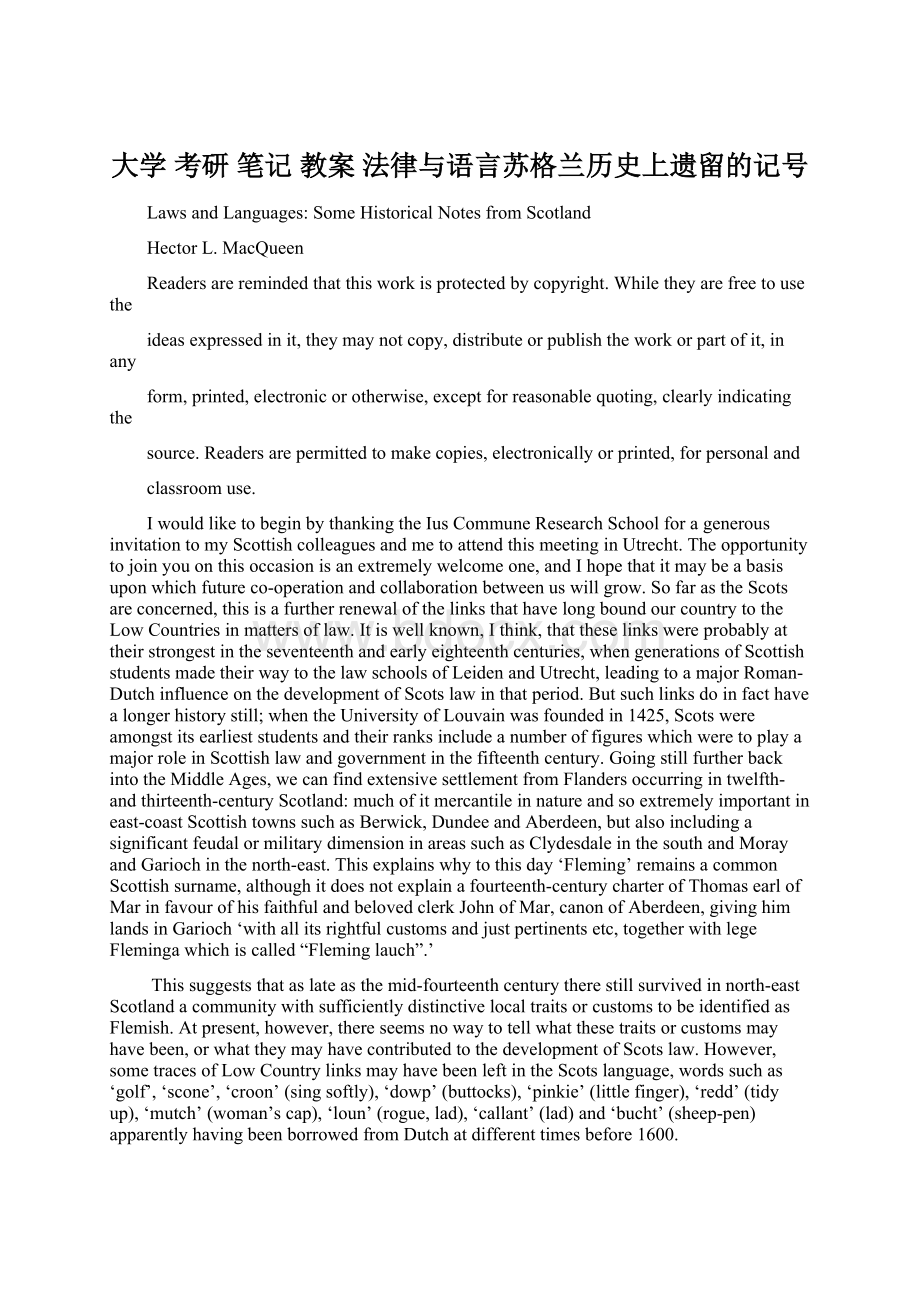大学 考研 笔记 教案 法律与语言苏格兰历史上遗留的记号.docx
《大学 考研 笔记 教案 法律与语言苏格兰历史上遗留的记号.docx》由会员分享,可在线阅读,更多相关《大学 考研 笔记 教案 法律与语言苏格兰历史上遗留的记号.docx(8页珍藏版)》请在冰豆网上搜索。

大学考研笔记教案法律与语言苏格兰历史上遗留的记号
LawsandLanguages:
SomeHistoricalNotesfromScotland
HectorL.MacQueen
Readersareremindedthatthisworkisprotectedbycopyright.Whiletheyarefreetousethe
ideasexpressedinit,theymaynotcopy,distributeorpublishtheworkorpartofit,inany
form,printed,electronicorotherwise,exceptforreasonablequoting,clearlyindicatingthe
source.Readersarepermittedtomakecopies,electronicallyorprinted,forpersonaland
classroomuse.
IwouldliketobeginbythankingtheIusCommuneResearchSchoolforagenerousinvitationtomyScottishcolleaguesandmetoattendthismeetinginUtrecht.Theopportunitytojoinyouonthisoccasionisanextremelywelcomeone,andIhopethatitmaybeabasisuponwhichfutureco-operationandcollaborationbetweenuswillgrow.SofarastheScotsareconcerned,thisisafurtherrenewalofthelinksthathavelongboundourcountrytotheLowCountriesinmattersoflaw.Itiswellknown,Ithink,thattheselinkswereprobablyattheirstrongestintheseventeenthandearlyeighteenthcenturies,whengenerationsofScottishstudentsmadetheirwaytothelawschoolsofLeidenandUtrecht,leadingtoamajorRoman-DutchinfluenceonthedevelopmentofScotslawinthatperiod.Butsuchlinksdoinfacthavealongerhistorystill;whentheUniversityofLouvainwasfoundedin1425,ScotswereamongstitsearlieststudentsandtheirranksincludeanumberoffigureswhichweretoplayamajorroleinScottishlawandgovernmentinthefifteenthcentury.GoingstillfurtherbackintotheMiddleAges,wecanfindextensivesettlementfromFlandersoccurringintwelfth-andthirteenth-centuryScotland:
muchofitmercantileinnatureandsoextremelyimportantineast-coastScottishtownssuchasBerwick,DundeeandAberdeen,butalsoincludingasignificantfeudalormilitarydimensioninareassuchasClydesdaleinthesouthandMorayandGariochinthenorth-east.Thisexplainswhytothisday‘Fleming’remainsacommonScottishsurname,althoughitdoesnotexplainafourteenth-centurycharterofThomasearlofMarinfavourofhisfaithfulandbelovedclerkJohnofMar,canonofAberdeen,givinghimlandsinGarioch‘withallitsrightfulcustomsandjustpertinentsetc,togetherwithlegeFlemingawhichiscalled“Fleminglauch”.’
Thissuggeststhataslateasthemid-fourteenthcenturytherestillsurvivedinnorth-eastScotlandacommunitywithsufficientlydistinctivelocaltraitsorcustomstobeidentifiedasFlemish.Atpresent,however,thereseemsnowaytotellwhatthesetraitsorcustomsmayhavebeen,orwhattheymayhavecontributedtothedevelopmentofScotslaw.However,sometracesofLowCountrylinksmayhavebeenleftintheScotslanguage,wordssuchas‘golf’,‘scone’,‘croon’(singsoftly),‘dowp’(buttocks),‘pinkie’(littlefinger),‘redd’(tidyup),‘mutch’(woman’scap),‘loun’(rogue,lad),‘callant’(lad)and‘bucht’(sheep-pen)apparentlyhavingbeenborrowedfromDutchatdifferenttimesbefore1600.
ItwasthoughtaboutthesemedievalmattersandtheconnectionsbetweentheLowCountriesandScotlandinthedevelopmentoftheiuscommune,oldandnew,thatfirstprovidedmewiththethemeIwishtodevelopalittletoday.ThethoughtswerefurtherreinforcedafewweeksagointheappropriatesettingofMaastrichtwhenIwasamemberofapanelofabouttenpersons,sixofwhomwereGermans,threeDutchandone(me)aScot;yetourlanguageforthepurposesofthepanelwasEnglish,anissueaboutwhichIwasreproached-quiterightly-laterintheconferencewhendiscussingthemeaningoftheword‘principles’.ThatinturnbroughttomindadebatethathasoccasionallysurfacedintheproceedingsoftheCommissiononEuropeanContractLaw,wherethelanguageisgenerallyEnglishbutFrenchisalsoofficiallyallowed.Howfarisacommonlanguageaprerequisiteofacommonlaw?
Ifso,howfardoesthechoiceoflanguagethendictatethesubstantiveoutcomeoftherulestobethecommonlaw?
Scotlandmaynotappeartobethemostobviousplaceinwhichtostartsuchadiscussion;therichlinguisticcomplexitiesoftheLowCountries,andtheintensepoliticalandlegaldebatestowhichtheygiverise,mightseemmuchmorelikelytoprovefertileterritoryforexploration.YetScotlandisnotsomonoglotasmightbethoughtfromadistance.CertainlyEnglishisthedominantlanguageofpublicandprivatediscourse,buttheScotsvernacular,springingultimatelyfromtheOldorMiddleEnglishoftheAnglo-Saxonswhowerepenetratingsouth-eastScotlandfromtheseventhcenturyon,hasagoodclaimtobesomethingmorethanavariantordialectofstandardmodernEnglish,intermsofbothvocabularyandsyntax,evenbeforeonebeginstotakeitsregionaldifferencesintoaccount.ThenthereisGaelic,thelanguageoftheHighlandsandIslands,nowmostlyconfinedtotheWesternIslesasafirsttonguebutalsoenjoyingsomethingofarevivalincitiessuchasEdinburghandGlasgow(thereisaGaelic-speakingplaygroupnearwhereIlive).Finally,therearethediverselanguagesoftheimmigrantcommunities,inparticularUrdu.Sometimesthelanguages,ortheirsupporters,comeintopoliticalconflictreminiscentofthelatemedieval‘FlytingofDunbarandKennedie’(alivelyexchangeoflinguisticabuseacrosstheScots/Gaelicdivide).Forexample,ScottishNationalistPartyproposalsforaGaelicLanguageBill,imposinguponpublicbodiesinScotlandadutytoprepare,publishandimplementaGaelicLanguagePlan,werefollowedrecentlybycomplaintsfromaScottishParliamentcross-partygroupontheScotslanguage,that‘therearepeople,includingMSPs,whospeakverydisparaginglyaboutbothScotsandGaelic,butScotsinparticular.’Gaelic(butnotScotsasdistinctfromstandardEnglish)isoneoftheofficiallanguagesoftheScottishParliament,andadebateona‘ProgrammeofActionforScotsandGaelicintheEuropeanYearofLanguages’wasconductedwithsomecontributions(includingtheMinisterialresponse)inthelattertongueon7September2000.
InDecember1993andagaininApril1994Scottishjudgesmadeheadlinesandgeneratednewspapercorrespondencecolumncontroversybythreateningtoholdaccusedpersonsguiltyofcontemptofcourtforusingtheword‘aye’ratherthan‘yes’whenseekingtoansweraquestionintheaffirmative.InparticularSheriffIrvineSmith,whohasawell-earnedreputationasalegalhistorianandalsoasasuperbspeakeratBurnssuppersandotherpost-prandialoccasions,isreportedtohaveadvisedonehaplessindividualthattheword‘ay’inScotsmeans‘always’ratherthan‘yes’.Rightlyorwrongly,itappearsthatingeneralthelanguageofHerMajesty’scourtsinScotlandistobetheQueen’sEnglish.Thisisborneoutbyotherrecentcaselaw:
in1982and1985,forexample,accusedpersonsweredeniedtherighttobetriedinGaelicwithaninterpreter,wheneachwasalsoabletospeakinEnglish.Wemaynotethat,exceptionally,theScottishLandCourtmustbystatuteincludeatleastoneGaelicspeakeramongstitsmembers.InJuly2001theSheriffPrincipalofGrampian,HighlandandIslands,inspiredbytherecentUKratificationoftheEuropeanCharterforRegionalorMinorityLanguages,laiddownthatthesheriffcourtsinStornowayandLochmaddyintheWesternIsles,andPortreeinSkye,wouldallowpartylitigantstoaddressthecourt,orwitnessestogiveevidence,inGaelicincivil(butnotcriminal)proceedings,providedthatnoticeoftwoweekswasgiven(toallowfortheprovisionofaninterpreter).Sheriffsmight,however,vetotherighttospeakinGaeliciftheyconsideredthatotherwisetheproperadministrationofjusticewouldbehampered.Ofcoursetheremayalwaysbeadashoflawyers’Latin(orcodemixing,aslinguisticdiscoursewouldhaveit)tobringlinguisticvarietyincourtproceedingsandinlegalwritingandteaching;althoughinJune2001theAppealCourtoftheHighCourtofJusticiaryhadtoconsideraclaimthatuseofthemaximomniariteetsolemniteractapraesumunturinproceedingsarisingfromtheeleven-timesrepeatedfailureofanindividualknownasRobbiethePicttopaythetollexigibletocrosstheSkyeBridgeinfringedRobbie’srighttoafairtrialunderArticle6oftheEuropeanConventiononHumanRights.Thecourtrejectedtheargument,presentedbyRobbieinperson,thathewasentitledtohavetheproceedingsconductedinalanguagethathecouldunderstand,because‘itwasclearfromtheappellant’spresentationofhisargumentthathedidfullyunderstandthemaxim’.
Wethereforeseemratherfarinmodernpracticefromthelinguisticdiversity(or,revertingtotheterminologyoflinguistics,languagecontact)which,asIshallnowargue,characterisedthepracticeoflawasitbecamethecommonlaw-oriuscommune-ofthemedievalkingdomoftheScots.ThedevelopmentofScottishcommonlawbeganinthetwelfthcentury,andfromthestartitslanguageofrecordwasLatin.Thelawcentredonland,andthechartersandotherdocumentswhichrecordedgrantsandtransfersoflandweregenerallyinLatin,althoughovertimedocumentsinScotsbecamemorecommon.Onlyin1847didstatuteprovidethathenceforthCrownwritswouldbeinEnglishratherthanLatin.The‘brieves’orwritswithwhichmanyformsofprocessbeforethemedievalcourtswerecommencedwerealsoinLatin,asweretheearliestrecordsofthecourtsthemselves.Theassizes,statutesandotherlegislativeactsofthetwelfthtothefourteenthcenturieshaveallcomedowntousinLatin,althoughitneedstobeborneinmindthatthesurvivingmanuscriptsinwhichtheyarerecordedareallofsignificantlylaterdatethanthematerialitselfandmaynotthereforereflectabsolutelyfaithfully